Some good content and context today - I received a call to enter a Current TV short film contest on tolerance. Don't know how I missed the year-ago launch of this Al Gore inspired network, but that is the way it is these days - isn't it? Yikes. Just try to keep up.

This post is long - but I found the content of especially the NYTimes article so compelling that I thought I should put it up front. And I will try to include some entertaining, if not relevant pictures to keep an interest.
This excerpted from a June 4 LA Times article:
http://www.current.tv/news/latimes060406Current TV is a year-old California-based cable channel created by Al Gore and Joel Hyatt to encourage every citizen to become both television viewer and programming contributor. As might be expected, some pieces take shots at the political right, such as an animated parody of President Bush. But others, such as a pair of pods on immigration, try for balance and describe both sides of an issue. Viewers can also contribute commercial advertisements.
Current also offers tutorials in filmmaking, journalism and storytelling from veterans including Sean Penn, Ira Glass, Dave Eggers and Catherine Hardwicke on its website (
www.current.tv).

Current's main operations are headquartered in San Francisco, where teams of employees evaluate hundreds of submissions from around the world in dozens of categories.
The Internet and "American Idol" have become runaway successes because they offer people a chance to participate. "Now we're bringing that to TV, 24/7," says Current host Max Lugavere. Similarly, IFC will introduce a half-hour series, "Media Lab," in June to showcase short films by aspiring filmmakers. More than 1,000 short films have been submitted to the ongoing show. Like Current, the highlighted films will be determined by the public's online vote. MTV has had film contests and E! collaborated recently with the YouTube.com website in a video contest. Viewers also contribute a variety of videos to other sites, such as Google, Yahoo and iFilms, which was recently purchased by Viacom, owner of MTV.
The NYTimes gives perspective on how Current fits into current trends. Excerpts from that:
http://www.nytimes.com/2006/01/22/business/yourmoney/22youth.html?pagewanted=2&_r=1http://www.current.tv/news/nytimes012206
The number of vehicles through which young people find entertainment and information (and one another) makes them a moving target for anyone hoping to capture their attention.
Advertisers and media and technology companies, mindful that young consumers have migrated away from the traditional carriers of their messages, have begun to find new ways to reach them. They are creating advertising and short videos for mobile phones, for instance, cell networks with dedicated game channels, and $1.99 TV programs to download to iPods and PC's.
And while the emerging generation's deftness with technology is a given, researchers say the most potent byproduct may be the feedback factor, which only accelerates the cycles of what's hot and what's over.
"We think that the single largest differentiator in this generation from previous generations is the social network that is people's lives, the part of it that technology enables," said Jack McKenzie, a senior vice president at Frank N. Magid Associates, a market research and consulting firm specializing in the news media and entertainment industries.
"What's hard to measure, and what we're trying to measure," Mr. McKenzie continued, "is the impact of groupthink, of group mentality, and the tendency of what we might call the democratization of social interaction and how that changes this generation's relationship with almost everything they come in contact with." 
Karell Roxas, 24, a senior editor at Gurl.com, begins each day in her Williamsburg, Brooklyn, apartment with a diet of Gmail, Hotmail, work e-mail, NYTimes.com ("I haven't picked up a print newspaper in forever," she says) and blogs, in that order. She says it is a necessary regimen for maintaining a functional dialogue both at work and in her circle of friends.
Ms. Roxas, who grew up in Ontario, Calif., and earned a fine-arts degree in writing from the Pratt Institute in Brooklyn, says text messaging by cellphone is the default mode of communication for her set, surpassing e-mail, instant messaging or even talking on the phone itself.
It is all in keeping with recent research from the Pew Internet and American Life Project, which has found that while certain aspects of online life have become common across many age groups, it is the millennials who live at the digital edge.
Among those with access to the Internet, for instance, e-mail services are as likely to be used by teenagers (89 percent) as by retirees (90 percent), according to Pew researchers. Creating a blog is another matter. Roughly 40 percent of teenage and 20-something Internet users do so, but just 9 percent of 30-somethings. Nearly 80 percent of online teenagers and adults 28 and younger report regularly visiting blogs, compared with just 30 percent of adults 29 to 40. About 44 percent of that older group sends text messages by cellphone, compared with 60 percent of the younger group.
And as the millennials diverge from their elders in their media choices, so do the ways in which they can be reached and influenced.
The preceding generation may have thought that e-mail, newsgroups, Web forums and even online chats accelerated the word-of-mouth phenomenon. They did. But they are nothing compared with the always-live electronic dialogue among millions of teenagers and 20-somethings.
"What we're seeing is a whole different relationship with marketing and advertising which obviously has ripple effects through the entire economy," said Mr. McKenzie, who heads the Magid firm's Millennials Strategy Group, formed two years ago to serve clients desperate to know how to reach a new generation. 
For the millennials, he said, "reliance and trust in nontraditional sources - meaning everyday people, their friends, their networks, the network they've created around them - has a much greater influence on their behaviors than traditional advertising."
Magid calls it the peer-to-group phenomenon - a digital-age manifestation of the grapevine.
"When someone wants to share it, forward it, record it, take a picture of it, whatever the case may be, that puts it into a form of currency," Mr. McKenzie said. "And when marketing gets to a level of currency, then it has achieved nirvana status."
And, he added, that status has "much more influence on the acceptance of television shows, or radio shows, or iPod offerings or jeans or whatever the case may be."
Some researchers, like Dr. Melvin D. Levine, director of the Clinical Center for the Study of Development and Learning at the University of North Carolina School of Medicine, have expressed concerns about the group-mentality dynamics that the Internet and the instant-message age may be fostering.
"You've got a group of kids who are unbelievably, incredibly loyal to each other," Dr. Levine said. "They are very bound to ethics and values. But in a funny sort of way, it prevents some of them from developing as individuals." Along with finding technological dexterity in this group, and a highly developed ability to work in team settings, Dr. Levine said he had encountered concerns that some young people lacked the ability to think and plan for the long term, that they withered without immediate feedback and that the machinery of groupthink had bred a generation flush with loyal comrades but potentially weak on leaders.
 Ms. Roxas would wholeheartedly disagree. Working at Gurl.com, she says that it is all too common for older people to dismiss the "MTV generation" as lacking concentration and wherewithal, as being team-oriented but bereft of individual ideas, and as being hopelessly addicted to the hive.
Ms. Roxas would wholeheartedly disagree. Working at Gurl.com, she says that it is all too common for older people to dismiss the "MTV generation" as lacking concentration and wherewithal, as being team-oriented but bereft of individual ideas, and as being hopelessly addicted to the hive.
The relentless multitasking and interactivity are "just a different way of doing things," Ms. Roxas said, recalling that even as an undergraduate she would often seek help and counsel among her peers through instant messages on her computer. "I actually got more done that way," she said, "and I always knew when to sign off and get my work done.
"It's no different than eating and watching TV at the same time."
But when asked if she might ever be able to really disconnect for a while, Ms. Roxas paused and then laughed at herself. To really unplug, while an attractive idea in theory, she said, would be to risk being swept aside by a virtual torrent of information - or, worse, being forgotten.
The television and film industries, like the recording industry before them, are slowly recognizing that consumers - particularly young ones like Mr. Hanson - want to watch on their own schedules, in a variety of formats, and at a low price.
Clearly, if the market doesn't find ways to make programming simple, inexpensive and legal to download, millennials will continue to find solutions for themselves.
"Downloading is the poor man's TiVo," Mr. Hanson said in e-mail message, adding, though, that if he likes a show he generally goes out and buys it on DVD.
As if heeding the call, ABC, NBC and cable networks have found a new outlet by striking deals that make television shows available for $1.99 a download on Apple Computer's iTunes Music Store, for playback on the new video-capable iPod or on a personal computer. Steven P. Jobs, Apple's chief executive, said this month that the company had sold eight million videos and television shows online since October.
Still, such convergence is in its infancy. And aside from CBS's reported plans for a short "mobisoap" video drama, written exclusively for delivery on cellphones, original content for platforms other than television is rarer still.
But the writing is even on Hollywood's wall.
In November, as if to nudge the entire industry, the National Academy of Television Arts and Sciences rather hurriedly introduced a new Emmy award for "outstanding content distributed via nontraditional delivery platforms."
 THE DEAD
THE DEAD

 Sheila Smith, Director of Photography
Sheila Smith, Director of Photography


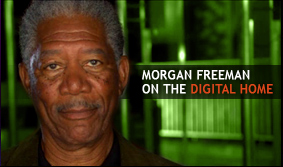
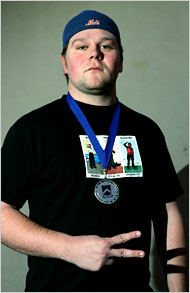



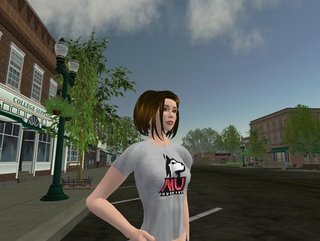



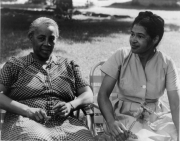
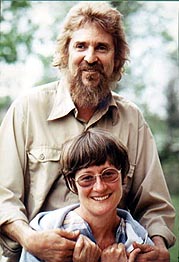 We were fortunate to have been hosted by Guy and Candie
We were fortunate to have been hosted by Guy and Candie 

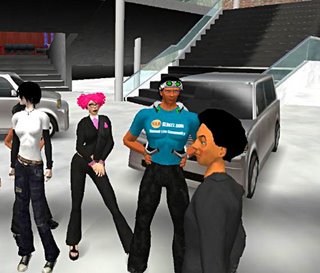

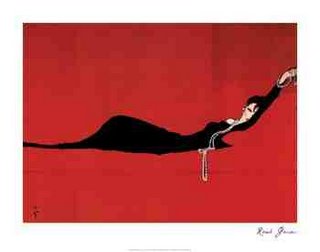


 Daniel Johnston is a manic-depressive genius singer/songwriter/artist, revealed in this portrait of madness, creativity and love.The Devil and Daniel Johnston is a stunning portrait of a musical and artistic genius who nearly slipped away.
Daniel Johnston is a manic-depressive genius singer/songwriter/artist, revealed in this portrait of madness, creativity and love.The Devil and Daniel Johnston is a stunning portrait of a musical and artistic genius who nearly slipped away. Director Jeff Feuerzeig exquisitely depicts a perfect example of brilliance and madness going hand in hand with subject Daniel Johnston. As an artist suffering from manic depression with delusions of grandeur, Daniel Johnston's wild fluctuations, numerous downward spirals, and periodic respites are exposed in this deeply moving documentary.
Director Jeff Feuerzeig exquisitely depicts a perfect example of brilliance and madness going hand in hand with subject Daniel Johnston. As an artist suffering from manic depression with delusions of grandeur, Daniel Johnston's wild fluctuations, numerous downward spirals, and periodic respites are exposed in this deeply moving documentary.


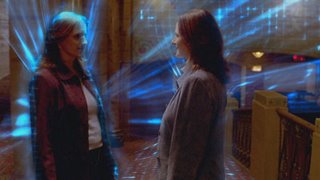








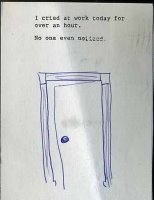
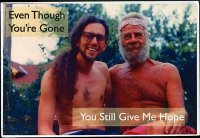

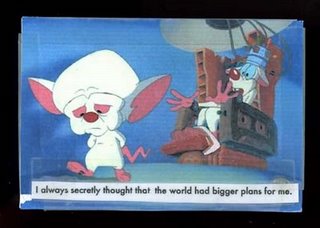


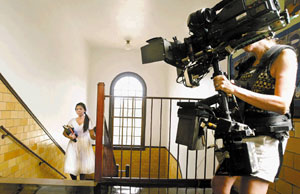





 Ms. Roxas would wholeheartedly disagree. Working at Gurl.com, she says that it is all too common for older people to dismiss the "MTV generation" as lacking concentration and wherewithal, as being team-oriented but bereft of individual ideas, and as being hopelessly addicted to the hive.
Ms. Roxas would wholeheartedly disagree. Working at Gurl.com, she says that it is all too common for older people to dismiss the "MTV generation" as lacking concentration and wherewithal, as being team-oriented but bereft of individual ideas, and as being hopelessly addicted to the hive.